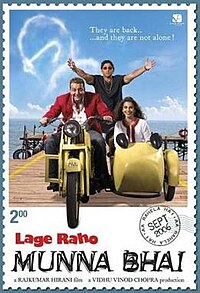Go 'head Munnabhai!

My comment is pretty long but I hope it will give you some Indian perspective on what makes LRM special.
Apart from the fact that it was quite entertaining, LRM was a hit throughout India, even in the south and even in small towns. This is a very rare event in itself since most new movies nowadays are designed for the city and overseas audiences. When I went to see the movie in Mumbai (Bombay) I could see people from all age groups in the audience. Even handicapped people and very old people had made an effort to come to the theater to watch the movie which is rare.
Now in India, movies are more than just entertainment. People take movies seriously, very seriously. They look up to movies as ideals to emulate. So you have some people jumping off huge heights after watching Krrish, people questioning their marriage after watching KANK, teens driving rashly after watching Dhoom and women copying the latest Bollywood costume designs.That's also why you have so many happy joint families, elaborate weddings and romance in Indian movies because that's what most Indians aspire for.
When Gandhi died, Einstein had correctly predicted "future generations would refuse to believe that a man like Gandhi ever existed" and that has indeed become the case with many Indians, specially teenagers. Most Indians read about Gandhi in history textbooks in school and acknowledge that he was an extraordinary human. But they also find Gandhi's ideals impossibly utopian. They don't think its possible to emulate his principles in practical life.
Also some Indians feel, perhaps only subconsciously, that we have not been able to carry forward Gandhi's legacy. The government in its public service broadcasts tells people, "Lets try and find the Gandhi in ourselves" but the common man doesn't know how to go about doing it. He wants practical ways to resolve his life issues.
What school history lessons could not do, this movie was able to do by presenting Gandhi in a lighter vein, showing how you can change people without resorting to force & violence. It showed that gandhigiri works.
The impact of the movie was that people asked themselves how they could apply Gandhi's ideals in their lives. Some people solved disputes amicably, even court cases were settled after using some of the methods in the movie. It worked for some, didn't work for others but the bottom line is people were willing to give peaceful conflict resolution a chance.
Also this movie caused an entire generation in India to rediscover Gandhi and that is no easy task. Teenagers actually became interested in knowing more about the Mahatma. Bookstores opened new sections on Gandhi due to increasing sales. People wanted to explore Gandhi's life and his ideology.
Outside the theater I could see people selling Gandhi's autobiography and many people actually buying it. Now that's much more than what you can expect from a movie. The effect may be temporary but it was a very positive one.

I only have three worthwhile additions:
- I love Circuit and I'm glad Munna finally apologized for slapping him around.
- Watching two old folks get married is about the cutest thing I saw all year.

- Numerology IS a silly excuse to add extra letters to your name.





5 comments:
Yeah, that "now he's married, now he's not" thing really irked me too, especially because so much of the first movie's plot had to do with him trying to get Chinki to marry him, even when he didn't really know who she was. But I got critiqued for calling this a sequel - and I guess by extension hoping the plot threads would, oh, I don't know, carry over - so I guess we have to chuck all of the first movie out the window except for the two basic characters. I'm not necessarily opposed to that, but it's certainly not what I was expecting to do. Then again, here I am, needing to remind myself that I am not the target market. I just keep reminding myself that I don't expect James Bond to carry over from one film to the other....
Does anyone else think that the Rosie-Donald Trump battle can be solved with a little TLC a la LRM?
I'd love to see Trump send Rosie bouquets of flowers and cards that say "get well soon". Or vice versa!
Everyone I know loves this movie. The way India has evolved in the last 60 years has changed people's perspectives on Gandhi's principles. Its good to see someone bringing them back.
Thanks t-hype for featuring my comment in your review. I don't have the time for a blog of my own but I guess this is the next best thing :)
The director of LRM mentioned yesterday that he intends to continue the Munnabhai series along the lines of James Bond or Charlie Chaplin movies where the main protagonists remain the same in successive movies while the other characters keep on changing. So only Munnabhai & Circuit will continue into the next movie in the series. This explains the disappearance of the other characters from the previous film.
Interestingly the next movie being planned in this series would involve Munnabhai going to USA and is expected to have a comment on the interplay between eastern and western civilizations.
Thanks in your publish that search has to end presently. You wrote the write-up inside a really very comprehensible way.
They look up to movies as ideals to emulate.
Post a Comment